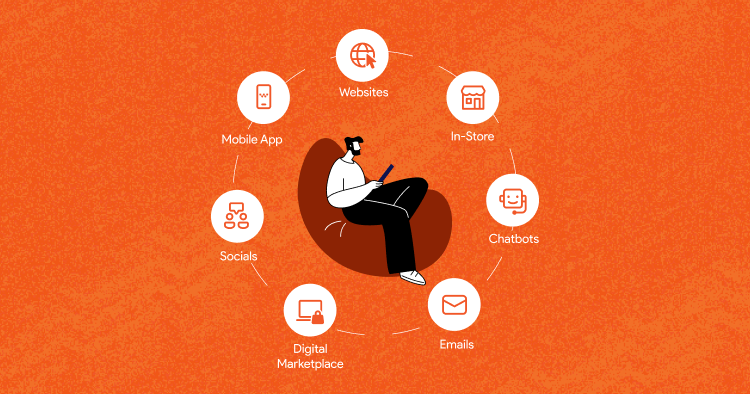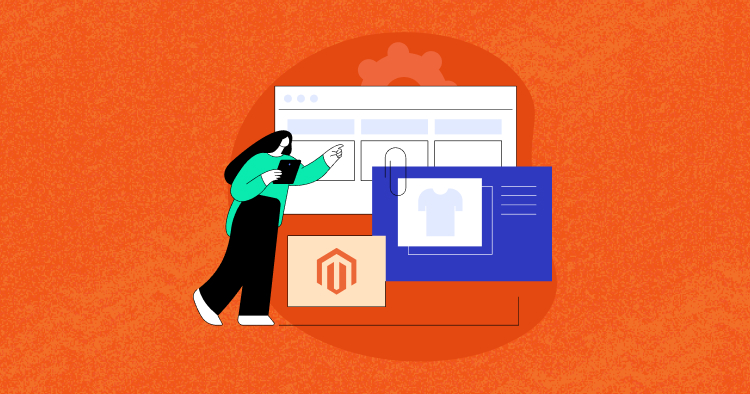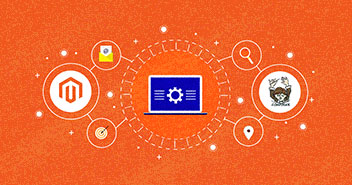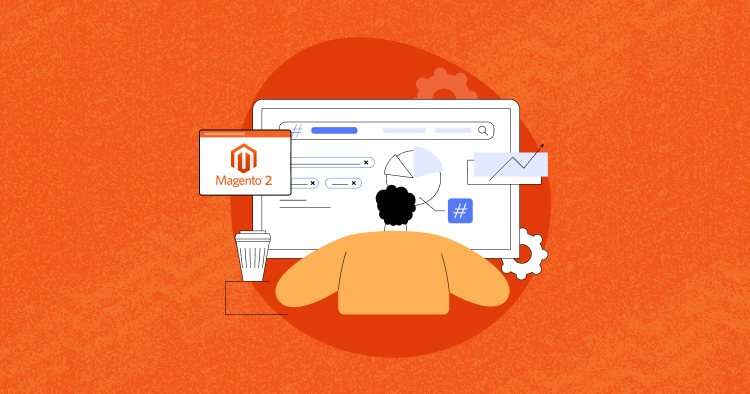
Customers today expect seamless experiences across all touchpoints with a brand. As a retailer, you’d know that sticking to one operational channel won’t cut it for the business.
There will soon come a time when you’ll have to tap into different channels for customer acquisition and servicing. At times, retailers can tilt towards one channel more than the other. But a successful business will have a strategy that closes most of the gaps between online and offline realms. Thus, offering a wholesome shopping experience to the customers.
Want that?
Omnichanneling your business via Magento can be the perfect solution for you. In this blog, we shall explore all things Magento Omnichannel. Brace up, and let’s go!
Fun fact: Stats show that running marketing campaigns on 3 or more channels can achieve a 494% higher order rate than marketing on just one channel.
Now, before we move unto why you should choose Magento as a part of your omnichannel strategy, let’s understand the channel thoroughly and the benefits it offers.
What Is Omnichannel, and How Does It Work?
An omnichannel approach means making your business accessible via different touchpoints. And to offer a well-integrated experience no matter how the customer approaches you.
A simple example of omnichanneling means a customer can make a cart online and pick up the order from the nearby physical store. Or see a post on your web store and inquire more about it via your customer servicing channel.

While there’s no fixed number of channels that make up for omnichannel strategy, the common ones are:
- Online store
- A dedicated application
- Brick-and-mortar store
- Internet of Things devices
- Social Media platforms such as Twitter, Pinterest, Instagram, Facebook
- Sales and customer service representatives
- Email and phone channels
- Newsletters (physical and digital)
Any and all channels you can tap into should be incorporated as part of your omnichannel strategy to offer a well-rounded customer experience.

The concept has attracted much interest over the past 5 years, as seen from the search trends above. And there are pretty good reasons for it.
Let’s look at some of the stats related to omnichannel to warm you up to its business potential:
- A study found that approximately 73% of people like to shop via multiple channels.
- 90% of retail leaders believe that an omnichannel strategy can make a business successful.
- Companies with strong omnichannel engagement retain 89% of their customers.
And there’s a lot more. Omnichannel is surely a growth strategy that reaps unmatched results. Almost all the big players in the business game have implemented it (think Nike, Adidas, Carrefour, Apple).
Omnichanneling might not be the answer for you when you have a small setup or are very restrictive about the budget. But for any established setup, whether mid-sized or large, it can reap great fruits.
A good strategy would be to jump to multichanneling as soon as possible. Once you have the right base, you can evolve into omnichanneling when the budget and resources allow.
Omnichannel vs. Multichannel
Now, omnichannel may sound a lot like multichannel. And while there’s an overlap, omnichannel and multichannel do have stark differences. Let’s have a look at them.
| Omnichannel | Multichannel |
| By definition, Omnichannel means covering all the channels you can. | Multichannel means entertaining several channels but not delving into all the ones that are available. |
| Focuses more on the experience of the customer and potential clients. | Focuses more on client engagement. Businesses in this area usually have one primary channel, and the rest are just crutches for the primary channel. |
| Omnichannel approach is more directed towards the customers (customer-centric). | Multichannel approach usually has different strategies for different channels (channel-centric). |
| Omnichannel strategy leads to better inventory management and data collection. | A multichannel strategy leaves channels a little siloed, which can result in mismanaged inventory and haphazard data collection. |
Overall, omnichannel is a more managed and sophisticated version of multichannel. If you are a business operating on a single channel, then multichannel will be beneficial.
But you should soon work towards implementing an omnichannel strategy as it is more coherent, offers a better customer experience, offers better inventory management and data collection, and is generally very profitable for businesses.
Now that you have the necessary details let’s see why Magento Omnichannel will be the perfect platform for your business for this strategy.
Why Choose Magento 2 as an Omnichannel Platform?
Magento is a versatile platform that can be the perfect choice for your omnichannel strategy.
The platform is super stable and offers high flexibility, scalability, and functionality. Many business giants in different industries have successfully implemented an omnichannel strategy using Magento 2. Some of the names include Land Rover, Timex, Kurt Gieger, etc.
Get Optimized Hosting For Your Magento Stores!
With Cloudways, you get the latest technologies, including Apache, Nginx, and PHP-FPM, No downtimes, high scalability, and 24/7 support!
The platform surely offers a great many benefits that we’ll explore below. Professionals in the web and app development industry also feel the same, as shown in a testimonial below.
Let’s now explore why Magento Omnichannel can be the perfect business strategy for you.
Third-party integrations

Third-party integration is what makes Magento 2 so powerful. There are several plugins or extensions available that are compatible with the platform.
Using them, you can craft a powerful omnichannel strategy for your online stores. This is possible because Magento is an API-led platform. You can even use the APIs to connect your online store with your shop’s point of sales (POS). This can help you with inventory management, cash management, customer tracking, etc.
Basically, it opens you up to countless opportunities. Let’s see some third-party integrations that can offer the best Magento Omnichannel solution for the business.
Magestore by Magestore
It’s a great extension that lets you connect your online store with the offline store. It helps you keep track of the sales and inventory across multiple sales channels. The plugin even lets you track inventory in real time, which also helps you with cost.
Some other benefits include:
- Let’s you manage stock visibility with barcode.
- Easy inventory management.
- Effective management of inventory and stock procurement.
Social Login by Miniorange
Social Login helps your users log in via their social media accounts. The plugin takes away the need for manual logins and saves time. This makes it easy for them to make purchases from your store.
Key features:
- Supports 40+ social networks and 50+ networks for Social sharing.
- Passwordless access for users
Fooman Connect by Fooman
Managing customer data, sales numbers, and other financials of your Magento 2 store is an easy process with Fooman Connect. The plugin is a great tool for operating stores internationally and at various locations.
Key features:
- Auto-export orders, credit notes, customer data, and sold items from Magento to Xero
- Triggers exports depending on the order status
- Matches the invoices to customer records in Xero
Personalized Shopping Experience
Photo by Freepik
People these days are loaded with offers from multiple businesses. Anywhere they go, be it a mall, Instagram, Facebook, WhatsApp, or whatever, they are bombarded with enticing offers.
Point – competition is fierce, and you must offer a personalized experience to win customers. And there are so many benefits to doing that. For example, stats show that:
- 83% willingly share their personal data with brands for a personalized experience.
- 72% of consumers only respond to personalized messages.
- Companies that hit the sweet spot with personalization have 40% more revenue potential.
So, the benefits of personalization are many. And Magento can help you get that with so many plugins and extensions. Some of the ones that you can explore are:
- Product Recommendations by Adobe Commerce
- Shop by Look by MageDelight
- Price per customer by MageDelight
- Email Templates by Template Masters
Magento 2 lets you offer personalizations on so many levels. Personalized online store experience, exclusive discounts, personalized emails, etc. All you need is creative implementations to turn personalization in your favor.
Security and Payment Option

Photo by Freepik
Offering a secure and reliable shopping experience to your clients is a must. Thankfully, that’s super easy to do with Magento.
Magento 2 itself is a powerfully secure platform. That’s the reason why most bigshots in the business game choose to operate on Magento.
But that’s not enough at times.
You must implement additional security measures to make your stores ironclad against hackers and other malicious online actors.
Some necessary steps that you need to take:
- Get a reliable SSL certificate.
- Get a reliable and secure Magento 2 Hosting. This will ensure that your website is always up and running and difficult to penetrate into.
- Use the latest Magento 2 version always.
- Install top-notch Magento 2 extensions such as Magento 2 Security, Improved admin security, and MageFirewall security.
Magento 2 security is important if you wish to implement the omnichannel strategy successfully. And in the same vein comes offering reliable payment methods to your customers. If the consumers feel unsafe, they’ll not go through with the transactions.
The best way is to offer multiple payment options to your customers. You can easily install reliable payment methods for your online store and POS. Some of the reliable payment gateways include Stripe, PayPal, 2Checkout, and Square.
Run Secure and Superfast Magento Stores with Cloudways!
Cloudways offers managed hosting solutions that are designed and optimized for Magento only. That way, your visitors receive a reliable and secure experience. ALWAYS!!!
Multi-channel Selling

Photo by Freepik
Magento 2 lets you establish a tight omnichannel setup via plugins and extensions. You can sell on several platforms while maintaining the right inventory stats, order statuses, customer reviews, etc.
You can sell on different channels such as Facebook, Instagram, etc. You can also integrate popular online marketplaces like Etsy, Amazon, and Walmart. Again, there are plugins to do that.
Let’s look at a few available options:
- Walmart Integration by CedCommerce
- Google Shopping by Magmodules
- Facebook Shop Integration by Sparsh Technologies
Having a well-rounded multichannel selling strategy is necessary for the success of your brand. And Magento omnichanneling can very well support you in this feat.
In-store Experience

Photo by iStock
Most omnichannel strategy demands a strong bridge between a customer’s online and offline experience. With Magento 2, you can offer a strong experience to your customers in your stores.
There are many things that you can do in this direction. For example:
- Allow people to see all the available items in your store online. You’ll need a strong inventory management system for that. You can implement that using plugins like Magestore.
- Let people purchase something in your store and allow them to pay you online. The more options you allow your consumers, the better it is. You can look into several payment gateways such as Stripe, Paypal, CartaSi, SagePay, etc.
- Get a more personal way to contact your consumers, such as WhatsApp. You can do it using extensions like Magento 2 WhatsApp Contact by Meetanshi. This way, you can take feedback, give personalized offers, and be in overall closer contact with the customer.
- Allow customers to place orders for customized products and update them via SMS using plugins like Magento 2 SMS Notification.
The ideas are endless. Anything you can think of to improve the in-store consumer experience is likely possible via Magento 2.
PWA Capabilites

Image by Divante
Progressive Web Applications (PWAs) are web pages with the same UI as an application.
They combine the functionalities of applications and web pages without needing a native application. Turning your Magento 2 stores into PWA is a very easy task. You can do so with the help of a Magento extension or plugin.
Some plugins to explore for this purpose are:
- Magento 2 PWA by SetuBridge
- Magetop Magento PWA Module
With the help of Magento PWAs, your business can enjoy the benefits of a native application without developing one.
And the best part?
PWAs work offline as well, so your customers and potential leads can run the PWAs even if they don’t have an internet connection.
Multilingual Capabilities

Photo by Marstranslation
Implementing a successful omnichannel strategy can mean catering to customers from different geographic locations. And not everyone will understand the English language. But that’s no excuse to lose customers.
With Magento 2 you can display web pages in different languages. So that it becomes accessible to people from almost all locations in the world. You need to have this feature integrated, especially if you operate in non-English areas.
Some plugins that you can use for this purpose are:
- Magento 2 Store Switcher by Mageplaza
- Magento 2 Google Language Translator Module by MageComp
- Magento 2 Multi-Language by MageWorx
These plugins also have data collection capabilities and can gather information about where your visitors and customers come from.
Powerful Reporting
Photo by Freepik
Successful businesses track their data closely and draw insights to improve customer experiences. Thankfully, that’s a possibility with Magento 2.
You can track each and every transaction, customer behavior, inventory, and other business operations. You can then generate reports via extensions and plugins and look for improvement areas across all sales channels.
Some of the great reporting Magento 2 tools are:
- Advanced reports by Amasty
- Magento 2 Inventory Report by BSS
- Magento 2 Advanced Reporting Extension by Mirasvit
With the right and tight reporting, you will always be updated with the business performance. This can help you produce better business strategies and offer a wholesome customer experience.
Easy Finance Management and Taxation
Photo by Freepik
Implementing a successful omnichannel strategy also means managing your finances and taxes right. It won’t make sense if you operate on different channels and manually calculate the finance and taxes for each.
You can manage both these things via different Magento 2 extensions. Some of the popular ones include TaxJar Sales Tax Automation and VAT Exemption.
Mobile Commerce Friendly
Photo by Magenticians
Targeting mobile phone users should be a priority for any business that wishes to implement a successful Magento 2 omnichannel strategy.
Why?
Statistics show that mobile phone users will grow to 7.49 billion by 2025. Currently, the number sits at 7.33 billion. These numbers represent over 85% of the world’s population.
People are fast leaving laptop devices and computers for ecommerce activities. About 60% of all internet traffic in 2022 came from mobile devices.
So, a profitable omnichannel strategy must have a mobile-friendly store or website. Usually, most Magento 2 themes are designed to be mobile-friendly. But there would be situations when you’ll need to have mobile-specific features for the users.
These are usually custom UI/UX decisions. The best way forward is to have a professional to help you with mobile responsiveness.
Even then, there are some extensions that you can explore for the purpose:
- Mobile Apps by Magecomp
- Multi Vendor Mobile App by Landofcoder
- Mobile App builder by Simicart
Benefits of Omnichanneling the Business
Now that you know the benefits of Magento 2 omnichanneling, let’s look at some benefits of the strategy itself.
Better customer experience and increased loyalty
When you treat a customer like royalty, they’ll stick with you for a long time. And they’ll even pay you a premium price for your products and services. Truth be told, most customers want a great shopping experience and they’ll happily pay you extra for it.
Stats show that brands with solid omnichannel strategies see a 9.5% yearly revenue growth and a 7.5% yearly decrease in cost per contact.
Better customer retention
Successful implementation of omnichannel engagement strategies can retain 89% of the customers. That’s so amazing because your business will have a reliable income stream and won’t always need to be on the lookout for new business opportunities.
Better complaint resolution
Omnichannel strategy is all about better customer experience. With a better customer management channel, the issues and queries get resolved faster, and the customer has a better experience.
Better insights for businesses
When businesses collect data from different sales channels, they have a better understanding of customer behavior. With diverse data, they’ll have an accurate picture of business operations and can make better decisions.
Less dependence on a single channel
Diversified business channeling will always have a cushion against negative contingencies. Recently we saw a boom in digital businesses during COVID while physical businesses took a serious hit.
Those already operational online businesses could easily converge their focus on digital channels and safeguard their revenues. Or at least minimize the losses.
Stats show that campaigns run on four or more channels outperform single and dual-channel campaigns by 300%.
There are so many other benefits of implementing omnichannel. For example:
- Managing stock levels and observing the inventory in real time.
- Brings in more footsteps into your physical store. Stats show that 81% of shoppers in physical stores search for things online before or while purchasing something.
- By having better customer insights and data, you can offer a personalized experience to the customers. This directly translates into better business growth and better customer experience.
Overall, the pluses of implementing the omnichannel strategy are many. Sure, you’ll need to invest more resources and money. But when done right, the fruits reaped are SWEET!
Let’s now look at some cases of successful omnichannel implementation using Magento.
Businesses that Successfully Implemented Omnichannel on Magento 2
Let’s look at some of the big brands that use Magento 2 for their omnichannel strategy.
HP – Hewlett-Packard Development Company, L.P.
HP is a tech giant famous for manufacturing computer goods and printers. The brand has its online stores powered by Magento 2. Their stores offer several features that offer a holistic customer experience.
For example, the store offers easy order placement, order tracking, shipment details, and even pick-up facilities depending on the geographic locations. Their websites also have a “find-at-store” feature where customers can see if a product is available at a nearby store or not.
This will save the customers’ time and effort. Also, from a business perspective, it saves resources because less footprint time in-store means fewer staff members, smaller stores, and well-managed service.
Paul Smith
A famous British fashion and apparel brand, Paul Smith is also a beneficiary of the Magento 2 platform. The brand has successfully set up a highly functional omnichannel for its customers.
It’s a brand that serves high-end customers; therefore, offering a well-rounded customer experience is crucial for it. Shifting to Magento brought several benefits for the brand. Some of them are:
- 15.5% increase in revenues.
- A 5% pump in mobile conversions.
- A jump of mobile users by 8.6%.
Overall, Magento 2 omnichanneling brought nothing but good tidings for the business. The brand also added PayPal as a payment gateway to assist customers with easy payments.
Coca-Cola
Who doesn’t know this age-old beverage brand? Turns out that Coca-Cola is also an Adobe customer.
The company used Magento 2 to implement an omnichannel strategy for the LATAM region. With a mix of Adobe Experience Platform, Adobe Commerce, Adobe Target, and Adobe Analytics, the company bettered up the UX.
In a short period of just a year, Coca-Cola witnessed a 45% increase in new accounts and an 18% increase in Average Order Value (AOV).
Wrapping Up – Magento 2 can be a choice for omnichanneling the business
Omnichannel strategy for businesses is surely a great one to implement. There are countless benefits of doing that, as mentioned above. And Magento 2 can be the perfect platform choice for doing that.
With its tight security and many extensions, it can bridge the gap between offline and online sales and marketing channels. Moreover, you can easily keep up with the business operations such as data management, inventory checks, accounts, and financial reporting, gathering customer insights, etc.
Keep in mind that setting up a Magento 2 store can be a bit expensive. If you’re interested in leveraging Magento omnichannel for your business, you should definitely check out Magento pricing before deciding to work on the platform. But the options that it offers are surely worth the price.
Already have a Magento store and are interested in enhancing its performance? Read our blog on Magento Optimization.
Want to enhance your Magento security? Do explore our blog on Magento security.
Q.What is omnichannel eCommerce?
A. Omnichannel ecommerce is a strategy implemented to provide customers with an amazing experience across all sales channels. This includes online platforms, social media, and even in-store experience.
Q.Why is Omnichannel Important for Ecommerce?
A. Omnichannel doesn’t just provide a seamless user experience. It also helps businesses gather extensive data from different touchpoints, which helps businesses grow better. Furthermore, it’s a strategy that widens the net for businesses. They receive customers from various channels rather than just one.
Q.Is Magento 2 suitable for Omnichannel solution?
A. Definitely, Magento 2 is a secure and reliable platform for implementing an omnichannel solution. Many big brands have used the platform to deliver better customer experiences via omnichanneling.
Raza Aslam Lakhani
I'm a digital content producer at Cloudways. I'm also a hodophile- always ready to explore new places and cultures. Other than that, I play guitar and love to indulge myself in deep, meaningful conversations. Always looking for opportunities to learn new things.


